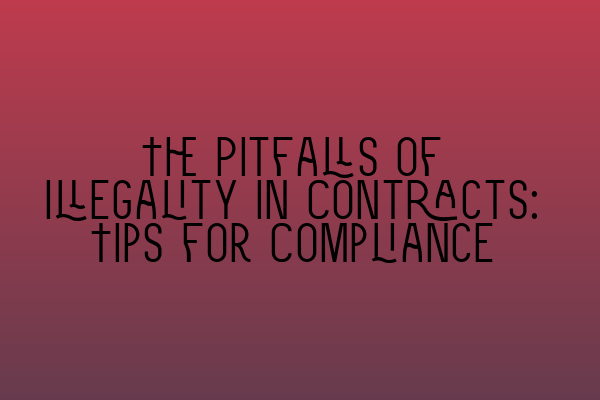As a solicitor, understanding the intricacies of contract law is essential. One particular area that requires careful consideration is the issue of illegality in contracts. Illegality can lead to severe consequences, including contract voidability, loss of reputation, and potential legal action. Therefore, it is crucial to be aware of the pitfalls and comply with the rules and regulations governing contract legality.
What Is Contract Illegality?
Contract illegality refers to the situation where a contract is formed to carry out an illegal act or to achieve an unlawful purpose. It is important to note that illegal contracts are not enforceable by law. This means that if a contract is found to be illegal, the parties cannot legally enforce the terms and may be subject to other legal consequences.
There are several types of illegality that can render a contract unenforceable:
- Statutory Illegality: Contracts that violate specific statutes or regulations are deemed illegal. It is essential to be knowledgeable about the relevant laws that govern your industry to ensure compliance.
- Moral Illegality: Contracts that go against public policy or morality are considered illegal. This can include contracts involving fraud, duress, undue influence, or contracts that are against the public interest.
- Illegality of Consideration: If the consideration (value exchanged between parties) of a contract involves an illegal act, the entire contract can be deemed unenforceable.
- Non-Compliance with Formalities: Some contracts need to meet specific formal requirements. Failure to comply with these formalities can result in the contract being declared invalid.
The Consequences of Illegality in Contracts
Entering into an illegal contract can have severe consequences for all parties involved. Here are some of the potential consequences:
- Voidability: Illegality can render the entire contract or certain provisions within the contract void. This means that the contract will be treated as if it never existed, and the parties cannot rely on its terms.
- Loss of Reputation: Participating in illegal activities can damage a company’s or individual’s reputation. This loss of reputation can affect future business opportunities and relationships.
- Legal Action: If one party suffers harm or loss due to an illegal contract, they may have grounds to take legal action against the other party. This can result in costly litigation, financial penalties, and further damage to reputation.
- Third-Party Rights: Illegality can also affect the rights of third parties who are not directly involved in the illegal contract. For example, if a contract violates environmental laws, it may impact the rights of individuals or organizations affected by the breach.
Tips for Compliance
To ensure compliance with contract legality and avoid the pitfalls of illegality, here are some key tips:
- Know the Law: Stay updated on the relevant laws and regulations that impact your industry or business. Seek professional legal advice if needed to ensure compliance.
- Draft Clear and Concise Contracts: Clearly define the rights, obligations, and purpose of the contract to eliminate ambiguity that could lead to illegality.
- Avoid Unlawful Activities: Refrain from engaging in activities that could lead to illegal contracts, such as fraud, bribery, or violating public policy.
- Seek Legal Advice: Consult with a solicitor when drafting or reviewing contracts to identify any potential issues of illegality and ensure compliance.
- Be Aware of Formal Requirements: Understand and follow any formalities required for specific types of contracts to ensure their validity.
- Regularly Review Contracts: Regularly review existing contracts to ensure they remain compliant with current laws and regulations. Update or terminate contracts that no longer comply.
To conclude, understanding the pitfalls of illegality in contracts and taking steps to comply with the law is crucial for solicitors and professionals in contract law. By adhering to legal requirements, drafting clear contracts, and seeking legal advice when needed, you can avoid the potential consequences of illegality and protect the interests of all parties involved.
If you found this article helpful, check out our related articles:
